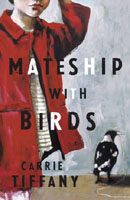 |
Mateship with Birds Carrie Tiffany Pan Macmillan 2012 |
[This book has been shortlisted for the 2012 Victorian Premier's Literary Award for Fiction.]
From the publisher's page:
On the outskirts of an Australian country town in the 1950s, a lonely farmer trains his binoculars on a family of kookaburras that roost in a tree near his house. Harry observes the kookaburras through a year of feast, famine, birth, death, war, romance and song. As Harry watches the birds, his next door neighbour has her own set of binoculars trained on him. Ardent, hard-working Betty has escaped to the country with her two fatherless children. Betty is pleased that her son, Michael, wants to spend time with the gentle farmer next door. But when Harry decides to teach Michael about the opposite sex, perilous boundaries are crossed.
Mateship with Birds is a novel about young lust and mature love. It is a hymn to the rhythm of country life - to vicious birds, virginal cows, adored dogs and ill-used sheep. On one small farm in a vast, ancient landscape, a collection of misfits question the nature of what a family can be.
Reviews
Helen Elliott in "The Sydney Morning Herald": "Always, always judge a book by its cover. Exuberant, droll, dashing, the cover of Mateship with Birds is a seduction. The text behind the picture is neither exuberant, droll nor dashing but it is equally seductive. And as to the odd title, it is not about mateship at all; it's about sex and it might just be the sweetest book about sex you will ever read...Carrie Tiffany's prize-winning debut novel, Everyman's Rules for Scientific Living (2003), was set in the Victorian countryside in 1933 and told of an unlikely relationship. Mateship with Birds has certain similarities...The book is almost under-written. It has, most unusually, a subterranean vitality that enables her to write of the natural world in a thrilling way. This natural world is her real subject and sex is a major part of that world."
David Sornig in "The Melbourne Review": "Given the genesis of the novel in places of intimacy and of carnal want, it should come as no surprise that its hook is to offer one (though I'm not saying which) of the classic romance trajectories. Its potential lovers might overcome the obstacles set before them, but just the same they might have been delivered the stuff of their potential out of order, in a knot that cannot be undone...Tiffany's writing tends toward the tangible; it reflects her own listening, her own observation. The country 'gets dark from the ground up' it has 'linen skies' and Harry eats 'a Sao dry just to put something in his mouth, just to hear the sound of it breaking rudely in his head - like kindling; like words.' "
Lisa Hill on the "ANZ LitLovers Liblog": "Mateship with Birds is a clever title for this book. While' bird' can mean both the winged variety and in slang, a sexually attractive woman, 'mateship' draws on dual meanings too: mating - finding a mate, courtship rituals and mating for life; and also the Australian notion of mateship - meaning a special kind of friendship: laconic, but loyal: an indivisible, enduring bond between equals. In an Australian bush town in the 1950s, the wooing of a woman is more complex than the instinctive courtship of birds, but if it succeeds, the down-to-earth relationship that emerges is solid and strong, a mateship for life. But how best can a lonely man achieve it? A slow, careful campaign that shows what a great father he'd be? Or give in to instinct and be a lover, as the birds do?"
Belinda McKeon in "The Guardian": "1953: an outpost in the Australian bush. We meet Harry, a middle-aged farmer to whom his cattle are like family and for whom his land is an extension of his own skin; and Betty, the life-worn single mother who lives across the way. You get the picture, or you think you do: dust and heat and isolation, all rolling out in a landscape of great natural beauty, alongside inner lives of loneliness and disappointment...But Carrie Tiffany's second novel is a smart and gutsy intervention in the bucolic set-up of its own making; her characters do very little of what we expect they might do, and plenty of what they feel like doing. 'Instinct, / from where I stand ... looks like love,' Harry remarks in his birdwatching notebook - yes, he is a farmer who keeps a birdwatching notebook, and not just any birdwatching notebook, but one which reads like an Elizabeth Bishop poem. Tiffany's novel is a frank and bewitching consideration of instinct, and of the ways in which it thrums through our every move."
Interviews
Gregory Day for "Readings".
Michael Cathcart for "Radio National".
Angela Meyer on her "LiteraryMinded" weblog.
